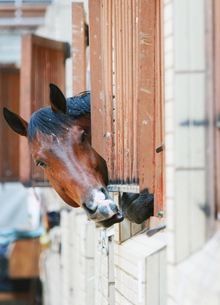According to AAEP publications, when most horses exhibit unsocial or obnoxious behaviors, there may be a good reason. Understanding what makes your horse "tick" can be rewarding for both you and your horse.

A "mouthy" horse
Horse owners can do something about equine misbehaviors by taking the time to learn a new way to work with their horse.
Does your horse commit any of these unsocial behaviors?
- Rubs against you with its head
- Steps, pushes or leans on you
- Pulls on the lead rope to eat or won’t keep up with you
- Is hard to load or catch
- Won’t tie
- Is head or ear shy
According to Dr. Glenn Anderson, an equine veterinarian near Tulsa, Oklahoma, your relationship with your horse doesn’t have to be that way.
You can definitely do something about equine misbehaviors. By taking the time to learn a new way to work with your horse, you’ll soon enjoy a companion, show horse or working partner that is safer and more pleasant for you as well as others to be around. In addition, your veterinarian will appreciate a patient that remains calm during an examination or treatment.
Dr. Anderson remembers the day he decided there must be a better way to work with horses. He usually got along fine with most of equine clients and patients. The few that caused trouble were either muscled into submission, restrained with devices or sedated.
But it wasn’t one of his clients’ horses that ultimately changed his life—it was his own, hard-to-catch mare that led him to seek out one of the master horse communicators, Ray Hunt.
Applying Hunt’s low resistance methods developed from a keen understanding of what makes horses react the way they do, Dr. Anderson learned to think more along the lines of “how to teach your horse to catch you.” He was so impressed with the turnaround in his mare that he began to incorporate this philosophy and its training techniques into his equine practice.
Dr. Anderson feels that many of his clients, like himself, inadvertently teach their horses to misbehave by rewarding disobedience. Inconsistent signals on the part of the handler are another factor that can lead to equine misbehavior. When time, the type of procedure or an owner who’s not interested in fixing their horse’s behavior problems are involved, he uses chemical restraint to get the job done and move on to the next appointment.
But when Dr. Anderson senses that an owner is willing to learn and improve themselves and their horse, he takes the time to show the horse and owner a better, easier way.
“Many times, I’m able to perform somewhat painful or frightening procedures with no tranquilizer at all, just by getting the horse to trust and listen to me,” he says. He advises owners to start a conversation with their veterinarian.
“Let them know you’ve ‘had enough’ and are willing to objectively listen then put into practice their advice on handling your horse,” says Dr. Anderson. He suggests that if your veterinarian is not comfortable addressing the topic, ask him or her to refer you to another local professional who is more of an expert in the area. Sometimes this referral may take the form of a video or audiotape or even hands-on clinic. But be cautious: all horseman are not alike.
Also keep in mind that, while rare, some horses are truly aggressive and dangerous. Pinning ears, charging humans and trying to bite or strike without provocation indicate the need for a professional.
However you decide to gain information and skills to improve the behavior of your horse, you’ll appreciate a better relationship with your equine friend. And when it comes time for the spring check-up and vaccinations, hopefully it goes a little smoother than last year.
Content from AAEP article By Lydia Gray, DVM
